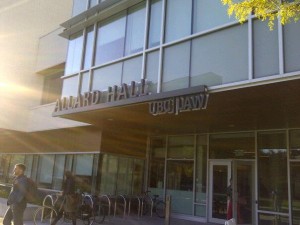In September of my first year I must confess that I was pretty confused as to why quite so many second years were walking around Allard Hall in suits (was there a secret dress code I was unaware of?) and I had absolutely no idea what the term “OCI” meant. This year, however, it was a different story entirely. While there are definitely some members of our class that did not have an interest in going through the on-campus hiring process for second year summers, it seemed as though it was all most of us could talk about.
So, what is an OCI? Rebecca Coad’s post from last year (found HERE) does a great job of giving an overview of the entire interview process, but in case hitting that link just seems like a little more work than you are willing to put in at this present moment (no judgment), I will give you a quick description. An OCI is a 17 minute preliminary on-campus interview that you have with larger downtown Vancouver law firms. The purpose is basically to give you an opportunity to meet with lawyers from different firms to get a sense of what it might be like to work at that firm and to ask any questions you may have. From the perspective of the employers, it is much the same – they want to get a feel for who you are beyond the black and white of your resume and cover letter in order to start narrowing down the pool of applicants to those who will receive in-firm interviews.
You might be thinking “That’s all well and good, but what is it really like?” Well, in the interest of full disclosure, I thought I would walk you through a relatively standard day at OCIs…
8:30 a.m. We arrive at the Life Sciences Centre and find our way to a huge common area that has three rows of blue, curtained booths taking up the majority of the room. There are 30 minutes left until our first OCI and already there is a group of UBC students sitting in what I came to fondly refer to as the holding pen. We check in, sit down and half glance at our notes while compulsively looking up at the clock in anticipation of our 9:00 a.m. interview. There is some nervous chatter, but for the most part we are quiet.
8:57 a.m. Jenn Lau, one of UBC Law’s amazing Career Services Office’s staff, comes on the speakers and informs us that “There are three minutes until the next OCI period starts”. This is our cue to leap up from our seat (perhaps a little too quickly for it to be an entirely natural movement), quadruple-check the map detailing the law firm booth locations, and to move to the start of the aisle leading down the rows of booths.
9:00 a.m. “The first OCI period starts now”. It is with this comment that we take off towards our destinations, keen to make sure we get there right on time so as to take advantage of the full 17 minutes. One of our friends half-whispers “It’s a race, I’m winning! I’m winning!” a la Rowan Atkinson in “Rat Race” which helps cut the tension a bit as we dart* into our respective booths.
Upon entry, the two lawyers from [insert law firm here] stand up to greet us, shake our hand, and then we all take our seats. The first question we are asked is how it is going, which we answer and then ask in return. Nerves are still pretty high but we have realized that this isn’t going to be as scary as we thought it would be which is, needless to say, a huge relief. What comes after this really varied from firm to firm, so I will give you some sample questions my friends and I were asked:
- I see from your resume that you like scuba diving/travel/soccer/cooking; can you tell me about that?
- During your undergrad, you transferred universities. Can you tell us why this was the case?
- Can you tell me a bit about this job that you worked? What was the greatest challenge?
- Why do you want to work at [insert law firm here]?
- What are you looking for in a law firm?
- What is a challenge you have overcome?
- What kind of law do you think you will want to practice?
Of course, these are just a few of the things that get brought up. Most interviews will be generally conversational with a few questions about your resume thrown in, but every firm will be slightly different. For example, sometimes things get more off topic than you would ever expect, and you end up spending 90% of your OCI discussing a celebrity or a city with a really bad transit system (both of which happened and both of which led to in-firm interviews for the students in those conversations).
9:15 a.m. The speaker system once again crackles to life and we are informed that there are two minutes left in the interview. We have gotten so caught up in the conversation that this ends up being the time for us to ask our questions that we have about the firm. We fire away and the lawyers do their best to answer in the remaining time.
9:17 a.m. “The interview period is over”. We stand up, shake hands again, take a business card from each of the lawyers, thank them for having met with us, and exit back through the curtain. We head back to the holding pen feeling a little more confident that we can do this.
9:20 a.m. Repeat. Depending on your scheduling prowess, this may have a nice spacing arrangement. Consensus among my classmates seemed to be that a perfect pattern would have been two interviews back to back, and then a 20 minute break. Back to back ones can be good because they give you the chance to hit your stride in the first one, then move to the next one without having time to properly get nervous. However, this will obviously be quite particular to the individual.
On the whole, the experience was a positive one for me, and not just because of the pirate-speak that came to accompany interview period warnings courtesy of a certain CSO employee. Regardless of whether or not I was fortunate enough to receive a second interview, I think that meeting and talking with the different firms helped me to come a little closer to figuring out what I want from my legal career and the kind of place that I would like to work. Also, as someone who didn’t have the opportunity to do much networking in my undergraduate degree (unless you count cleaning rat cages as networking, which I definitely don’t), I find any chance to further my interpersonal skills and assess potential areas of improvement really valuable.
We are still in the interview process as I type, and as such, I would like to make a general statement: while OCIs are undeniably stressful, as is the entire process of applying for second year summer jobs, it is important to remember that everyone is in the same boat. Regardless of whether a student had twenty OCIs or one, I can guarantee you that they have something that they felt really worried about. We all just need to remember that these things have a way of working themselves out for the best and that even if we aren’t initially happy with the way it turns out, there are other options. With that said, good luck to my fellow classmates still working through the process!
*Note that this darting is often somewhat impeded by the difficulties we have in finding the curtain opening. Actually, finding the curtain opening is probably one of the top 5 hardest parts of OCIs (hey – I didn’t judge you for not hitting that link earlier, don’t judge me until you too have experienced the degree of experimental swatting that occurs!)



